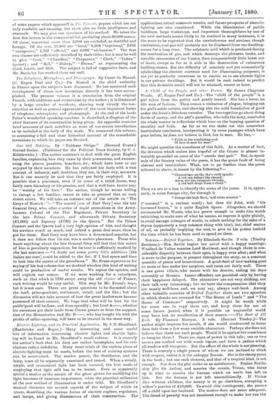Our Old Nobility. By "Noblesse Oblige." (Howard Evans.) Second series.
(Published for the Political Tract Society, by C. J. Kibblewhite.)—The author continues to deal with the great English families, explaining how they came by their possessions, and enumer- ating the places, pensions, benefices, &c., which have been or are enjoyed by their members. He has collected his facts with a vast amount of industry, and, doubtless, they are, in their way, accurate. But it can scarcely be said that they are fairly employed. It is possible that a placeman, even if he come of a titled house, may fairly earn his salary or his pension, and that a well-born rector may be " worthy of his hire." The author, though he seems willing to except a few families, seems to take, as granted that no such desert exists. We will take an instance out of the article on " The Greys of Howick : "—" The second [son of Earl Grey] was the late General Grey, who, after a series of rapid promotions in the Army, became Colonel of the 71st Regiment, Private Secretary to the late Prince Consort, and afterwards Private Secretary (£1,000) and Equerry (£750) to the Queen." But the Prince Consort and the Queen had a very high opinion of him, and thought his services worth as much, and indeed a great deal more, than he got for them. Earl Grey may have been a determined nepotist, but it does not follow that his son was a useless placeman. Those who know anything about the late General Grey will feel that this notice of him is peculiarly ungracious, for its tone is sufficiently marked by the last sentence :—" I doubt not some pretty little additions [the italics are ours] could be added to the list, if I had space and time to look into the career of the grandsons." Mr. Evans reproves us for saying of his last volume that we doubted whether this kind of writing could be productive of useful results. We repeat the opinion, and will explain our reason. if we were working for a cataclysm, such as that which in '1789 swept away the old regime of France, such writing would be very useful. This may be Mr. Evans's hope, but it is not ours. There are great questions to be discussed about the land, primogeniture, settlement, entail, and the like ; but the discussion will not take account of how the great landowners became possessed of their estates. We hope that what will be best for the pnbliegood will be done, and done speedily ; but Lord A—, whether his ancestors got their lands from Crown grants or from the suppres- sion of the Monasteries, and Mr. B—, who has bought his with the profits of calico-spinning, will have to be treated in the same way.


































 Previous page
Previous page